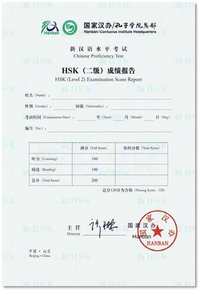HSK (written) and HSKK (oral) are standardised language examinations that test the Chinese language skills of Chinese learners. The examination is held in certified examination centres worldwide. As an internationally recognised standard test, the function of the HSK examination is similar to the "Test of English as a Foreign Language" (TOEFL) for the English language.
The written HSK test and the oral HSKK test are held independently of each other.
The HSK test (written) consists of six levels. The HSKK test (oral) is divided into three levels: Beginner, intermediate and advanced.
HSK level 1: The examinee is able to understand and use simple expressions and sentences.
HSK level 2: The examinee is able to manage everyday situations easily. The target group of this examination is people who have already completed the beginner level of Chinese as a foreign language.
HSK level 3: The examinee is able to understand the content of familiar situations in the subject areas of work, school, leisure etc.
HSK level 4: The examinee is able to discuss various topics in Chinese, and to communicate spontaneously and flexibly. Talking to native speakers is possible without great effort.
HSK level 5: The examinee is able to read Chinese newspapers and magazines, watch Chinese films without major problems, and give a speech in Chinese.
HSK level 6: Anyone who passes the sixth level of the HSK examination can easily understand almost everything they read or hear, and can express themselves spontaneously, fluently and precisely.
The 6-level HSK examination system, which has existed in this form since 2010, will be revised and expanded in the coming years. What does this mean for your future examinations and the certificates you have already obtained?
Nothing will change for candidates at levels 1 to 6 over the next two years. The requirements will remain as they are. The certificates you have already obtained will remain valid.
HSK levels 7 to 9 will be added from March 2022. These HSK levels will be relevant for people who wish to complete a master's degree or doctorate in China or who wish to study Chinese language, culture, history and philosophy in China. Unlike levels 1 to 6, these are not separate examinations. All candidates who wish to obtain an HSK certificate at levels 7 to 9 are given the same examination questions. The number of points achieved in the exam then determines - as with a school grade - which HSK level the examinee has achieved.
In 3 to 5 years, HSK levels 1 to 6 will also be gradually adapted to the new standard. It is not yet clear what the adapted version will look like.
You can find detailed information on the new HSK standard on the website of the Chinese Ministry of Education:
http://www.moe.gov.cn/jyb_xwfb/s271/202104/t20210402_524194.html

As an internationally recognised standard test, the HSK examination has a function that is similar to the "Test of English as a Foreign Language" (TOEFL) for English or the "Japanese Language Proficiency Test" (JLPT) for Japanese.
The HSK certificate therefore serves as:
The certificate is valid for an unlimited period, the examination report for a period of two years from the date of the examination. Duplicates of this certificate, e.g. for job applications, can be ordered online for a fee within two years, from "Chinese Testing International" (http://www.chinesetest.cn).
Only the following items can be brought with you to the examination room:
Each part of the examination (listening/reading/writing) has its own time limit. During the specified time only the corresponding sections of the test can be worked on, not other sections. Test documents are the property of the HSK centre. At the end of the examination all test documents must be collected in full.
Information on exam registration is available here.